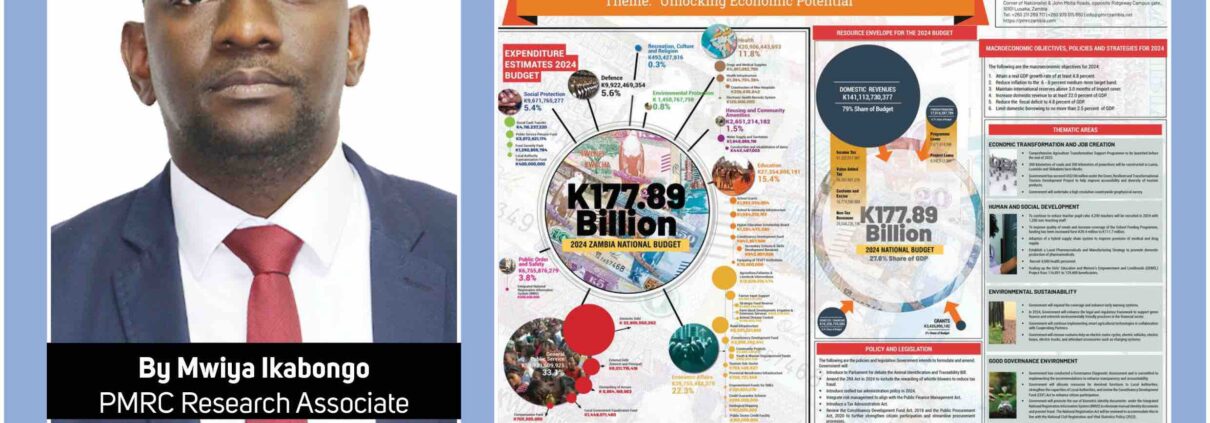Overview
The 2024 National Budget, under the theme “Unlocking Economic Potential,” signifies a pivotal moment for the nation. This theme reverberates deeply with Zambia’s abundant natural resources, diverse cultural heritage, and a highly skilled workforce. The budget delineates strategic investments in pivotal sectors, including agriculture, tourism, and manufacturing, with the objective of catalyzing economic expansion and employment generation.
Sector-by-Sector Analysis
Agriculture
Agriculture forms the bedrock of Zambia’s economy, supporting a significant portion of its populace. Notwithstanding, persistent challenges such as climate change and inadequate investments have hampered the sector’s growth. The 2024 budget takes a laudable stride by allocating substantial resources to agriculture. These funds will bolster initiatives such as irrigation development, fertilizer subsidies, and research and development, all of which are integral components for enhancing agricultural productivity and food security. A noteworthy aspect is the increased allocation for strategic food resources through the Food Reserve Agency, facilitating the early purchase of essential crops like maize and soybeans to mitigate post-harvest losses. However, expediting the implementation of the Comprehensive Agriculture Transformation Programme (CATSP) remains crucial to enhancing efficiency within this sector.
Tourism
Zambia boasts a trove of natural resources and cultural heritage, yet its tourism sector has not reached its full potential, primarily due to infrastructure deficiencies and insufficient marketing. The budget addresses these issues by allocating resources to tourism infrastructure development and promotional endeavours. This strategic move has the potential to attract a greater number of visitors, foster job creation, stimulate economic growth, and simultaneously safeguard the nation’s natural and cultural treasures.
Manufacturing
The manufacturing sector holds substantial potential for job creation and economic expansion, but it has grappled with high operational costs and limited access to financing. The budget recognizes the pivotal role of this sector and allocates resources to alleviate these challenges, thereby cultivating a more conducive environment for economic growth. The support of local manufacturing not only reduces import dependency but also encourages entrepreneurship and innovation.
Social Sectors
Beyond sector-specific investments, the budget also recognizes the significance of social sectors such as education and healthcare. These sectors have witnessed a record increase in funding, with education allocated K27.35 billion and health K20.91 billion. These investments are instrumental for human development, ultimately contributing to a healthier and more educated workforce.
Taxation
The budget maintains a relatively stable tax regime. While no major changes are proposed, the budget introduces minor adjustments, such as raising the personal income tax exemption threshold and reducing the corporate tax rate for small businesses. These changes aim to stimulate economic activity, encourage entrepreneurship, and alleviate the tax burden on low-income individuals. The mining sector has seen an increase in budgetary allocation in an endeavor to enhance production capacity; a key highlight includes aerial mapping of mineral deposits in the country.
Overall Budget Assessment
The 2024 Zambian national budget is a comprehensive strategy designed to effectively harness the country’s economic potential. Through investments in key sectors, enhancements in social services, and modest adjustments to the tax system, it presents a pragmatic approach to drive growth and employment. However, the success of the budget is contingent on its implementation, active collaboration with the private sector, and engagement with civil society. Accomplishing these objectives will enable Zambia to unlock its economic potential, fostering prosperity for all its citizens.
Additional Thoughts
We commend the Government for recognising the imminent threat climate change poses to Zambia’s economy and its populace. To optimally leverage the increased budget for environmental sustainability, we urge the Government to:
- Develop comprehensive policies and legislative measures aligned with the National Climate Change Policy.
- Invest in weather stations for early warnings.
- Streamline the Environmental Impact Assessment process.
- Consider supplementary policies for electric vehicle infrastructure and renewable energy incentives.
- These actions will facilitate sustainable outcomes, address climate challenges, and guide the nation towards a greener future.
- The Government ought to operationalize the Comprehensive Agriculture Transformation Programme (CATSP) to create a holistic agricultural transformation future for the sector.
- Conclusion
The 2024 National Budget offers a promising trajectory. In addressing the areas of improvement highlighted above, the Government can enhance the budget’s efficacy, ensuring that it genuinely unlocks Zambia’s vast economic potential and paves the way for a brighter future for all Zambians. Simultaneously, prudent financial management systems, in conjunction with a robust macroeconomic environment, will be pivotal in steering budget implementation for the 2024 fiscal year.




